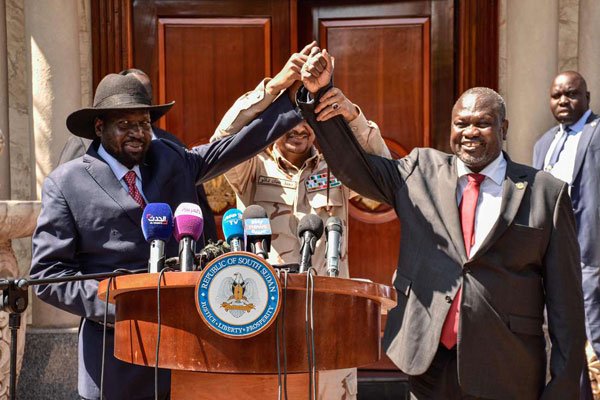The formation of the transitional government in South Sudan could be unduly delayed following disagreements over portfolio balance between President Salva Kiir and first Vice President Riek Machar.
Meetings in Juba on February 27 could not reach a compromise after Dr Machar’s Sudanese People’s Liberation Movement in Opposition (SPLM-IO) complained that President Kiir’s side has not only taken all the key ministries, but has been offering ministries to other signatories without consultations.
President Kiir’s side wants to retain the Finance, Petroleum, Defence and Interior, and Foreign Affairs dockets.
James Oryema, the SPLM-IO representative in Kenya said that his movement is going to hold on to their position and that the formation of the transitional government of national unity (TGoNU) could take some time if the other side remains intransigence.
“We are demanding that four ministries be divided into two while claiming the Petroleum and Interior dockets then we can select the rest of the remaining seven ministries. These were the ministries we had in 2016,” said Mr Oryema.
According to the September 2018 agreement, the country is supposed to have 35 Cabinet ministers, with President Kiir’s SPLM in government getting 20 ministries, SPLM-IO nine ministries; South Sudan Opposition Alliance (SSOA) three; and Former Detainees two and Other Political Parties one ministry each.
According to the agreement, the parties are required to choose ministries according to the percentages from the three clusters; Governance, economic and services, with President Kiir allowed to pick the first 20 ministries and five deputies, followed by Dr Machar who has nine slots, in that order.
Joseph Bangasi Bakosoro, a leading member of the South Sudanese Opposition Alliance (SSOA) said that the grouping has agreed on the selections of their ministries, but did not give names. But, SPLM deputy spokesman Peter Manawa accused President Kiir’s side of offering ministries to other signatories without consulting them.
In the 2015 agreement that collapsed in 2016, President Kiir had agreed to give Dr Machar the Petroleum ministry and after the collapse of the transitional government in July 2016, the president at one time appointed Deng Alor, a member of the former detainees as foreign minister.
However, in a sign that there is positive movement in the political process, the collegiate presidency had their first meeting held on February 26 in which they forgave each other as a first step towards national reconciliation.
Chaired by President Kiir, it was attended by all the five vice-presidents: Dr Machar; James Wani Igga, Taban Deng Gai, and Rebecca Nyandeng De Mabior, who proclaimed that they have forgiven each other.
The presidency also called for the internally displaced people living in the UN-hosted Protection of Civilian camps and refugees outside the country to return to their areas of origin.
“The presidency wants to inform the people of South Sudan that there are committees from all sides working on the allocation of the ministries and the Cabinet will be announced as soon as committees furnish their work,” said the statement issued after the meeting.
But the delays in constituting of the transitional legislative assembly a week after the signatories officially started the process on February 22 is holding back the political process.
For most of the week, many of the parties said they had identified their nominees in the transitional legislative assembly and the Cabinet, but were awaiting to reveal the names during the formal appointments.
The former SPLM in Government led by President Kiir were allocated 332 seats, the SPLM in the opposition led by Dr Machar were allocated 128 MPs; South Sudanese Opposition Alliance (50 MPs); Other Political Parties (30 MPs); and Former Detainees to have 10 MPs.
According to the agreement, the parties are required to present the names to the National Constitutional Amendment Committee (NCAC) to determine whether they have met the legal requirements for youth, gender and special needs.
Once constituted, the transitional legislative assembly is supposed to vet the ministers and the deputy ministers that will be nominated by the signatories to the agreement.
The transitional government will have one president, five vice presidents, 35 ministers, 10 deputy ministers, 550 MPs, 10 governors and three Area Administrators.
By The Eastafrica



